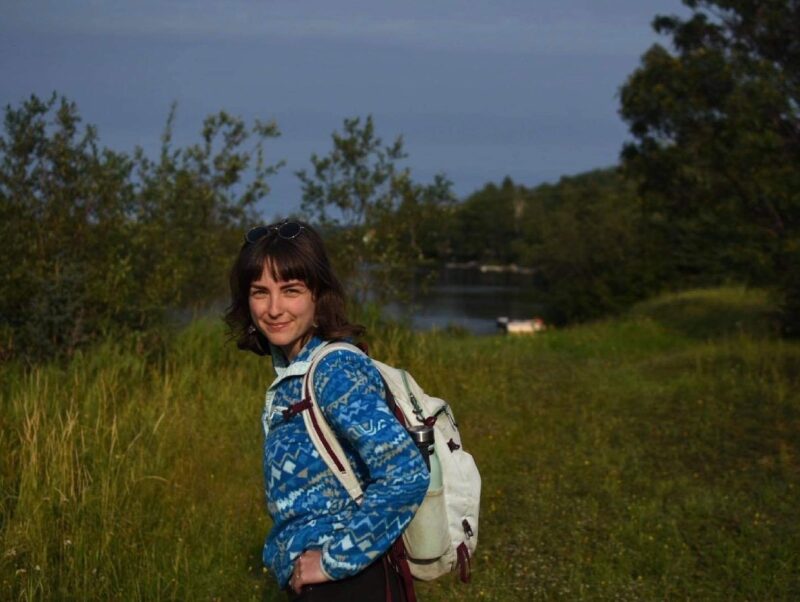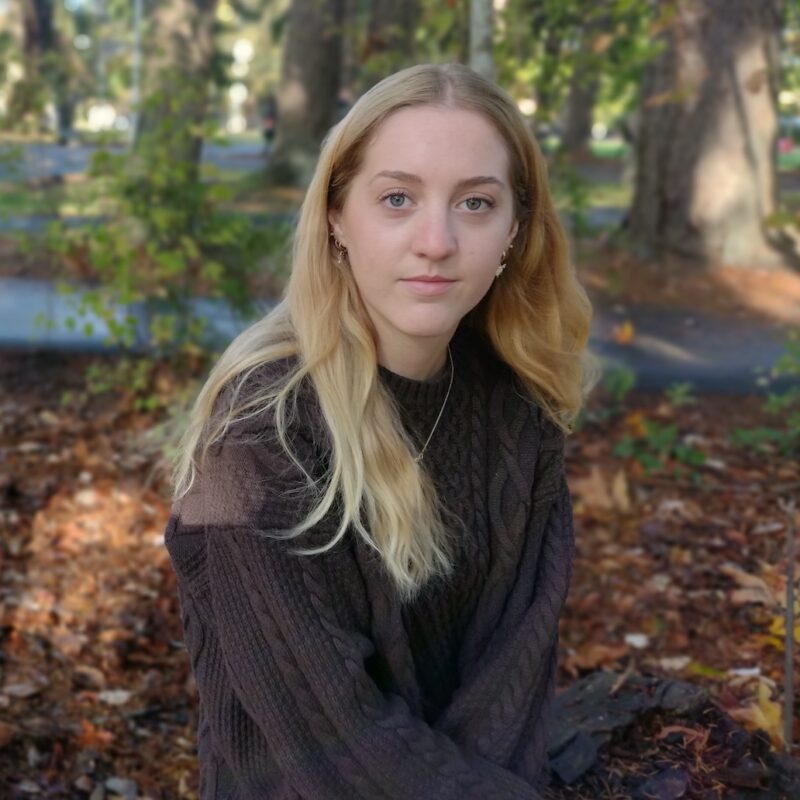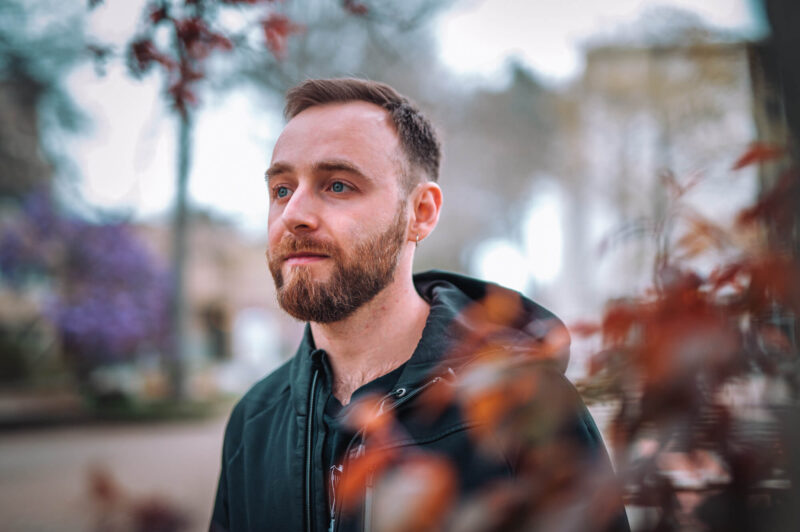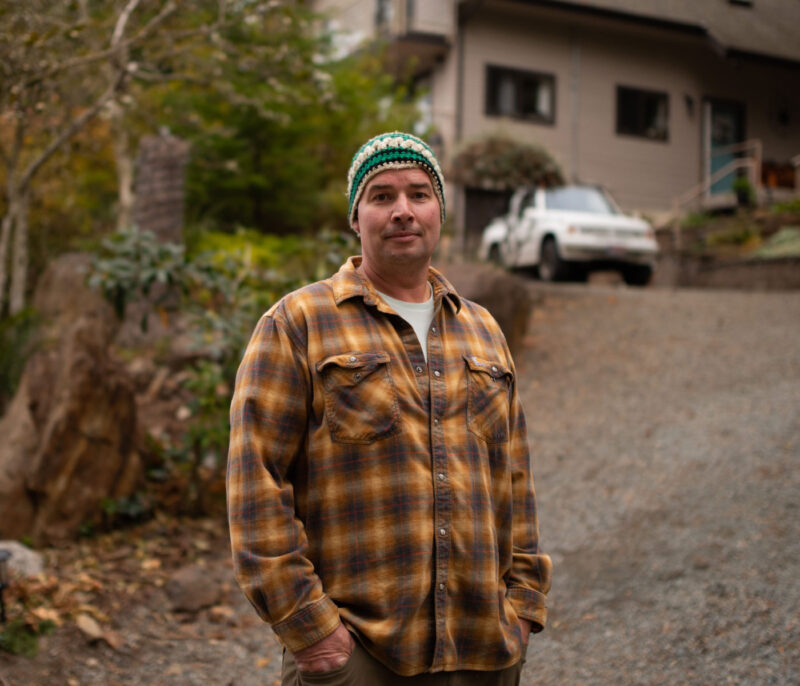“It was apocalyptic.”
Leslie Amminson

Leslie Amminson, 25, is a reporter born in St. John’s, Newfoundland. Growing up, she spent much of her time immersed in nature and next to the ocean. Hiking the East Coast Trail and swimming amongst the great outdoors are some of her fondest memories. “I’d say I have a lot of attachment to home for sure.”
Leslie is also an avid writer and musician. As a teenager, she would play original songs in bars downtown; as of right now, she plays in a band. Writing fictional stories and practising guitar are passions she has carried throughout her life. Leslie said her friends and family would describe her as outgoing, positive, and although serious on occasion, someone who overall just loves to laugh.
In 2019 Leslie moved from St. John’s to Halifax, Nova Scotia, to obtain a masters in journalism. Now, she works as a producer for CBC Radio. She lives with her partner, who is also a journalist. “When I feel most myself is when I feel like part of something,” Leslie said. “Like I am part of a community, a common goal, or a mission.”
When you’re living by the ocean, you’ve been battered a lot. It’s not unusual for us to get 100-kilometre-an-hour winds if we do have a storm. But it was a very odd 24 hours when we had Hurricane Igor in Newfoundland. It was 12 years ago, but people still remember it very vividly. It was apocalyptic.
I will never forget it because we lost our power for three or four days. We spent that night and the next day with the fire on just trying to stay warm and cozy. You can hear the rain. You can hear the wind all the time. The wind just howls and howls so it’s very eerie, and you could almost feel the house shake.
We had a big, big tree with a really thick trunk that had been in our garden forever. I remember my father looking out the window and seeing the roots coming up against the ground. The tree made the ground look like it was breathing. I remember my father looking out and being like, “Look at the ground. That tree is going to come up.” Eventually it just toppled down on our neighbour’s house and took down our neighbour’s phone wires. You just knew that that was going to happen, but there’s nothing you can do about it.
There were stories of people who had trampolines in their yard. The whole trampoline would come up and just bounce down the road. I knew one person whose greenhouse came up and flipped, then landed solidly on its feet again. And all of these huge old trees in the city toppled over. A lot of them had really long roots. You’d be walking around the city and you’d just be seeing the base of the trees.
The cleanup was massive. Some of my family members work for the city so I do remember them working a tonne—that being a huge ordeal to go around with chainsaws and chop up all the old trees that came down.
We know that there are more hurricanes in this neck of the woods now because of climate change. The weekend I moved [to Halifax], I had been here for three days, and then we had a hurricane. It was Hurricane Dorian.
You wouldn’t want to walk around outside because pretty heavy objects are blowing all over the place: trees, branches, and the news item that I remember most was the crane. There was a crane working downtown, and it collapsed because of the wind and fell on this building.
Friends from out West didn’t understand what was going on. I don’t think that they’d ever really seen winds that get that high. They were like, “What is this?” The people from the East Coast had a bit of a warning. “Oh, that’s just a hurricane. This is okay.”
I didn’t really have a lot to lose in this scenario. If it’s your house, it’s a bit different than if you’re renting. And I actually remember having a lot of fun during this period. I didn’t really know my roommates that well. It was an interesting time to just not go to school and spend a lot of time getting to know each other. We liked to play conversation games, and cards, and had our candles lit.
I’m used to the wind and the seawater getting pretty high; those kinds of surges. Maybe, you know, we’d lose power for an afternoon and the wind would stop. It really didn’t. We were one of the last neighbourhoods to get power back, and that was pretty wild. I remember not being able to shower for a really long time. After a while, I was like, “Okay, I need some hot water, and to be able to cook.”
You start to see these events that I think used to stand out as very memorable storms become a bit more like the norm. We get more tropical weather events than we used to. I don’t remember that happening a lot in my childhood.
We try our best not to have too much waste in the house, and not to drive unnecessarily, and those things. Sometimes it feels a bit futile. If you get involved in activism, I really think that’s the only way that things are going to change. I’m used to the wind and the seawater getting pretty high; those kinds of surges. Maybe, you know, we’d lose power for an afternoon and the wind would stop. It really didn’t.
There’s been a fair amount of climate strikes here. A lot of Indigenous-led and student-led climate protests, which was really heartening to see. You’d just be looking out, and seeing a tonne of people with signs; a lot of children, and teenagers, and young people.
I’m a pretty young person, but I definitely didn’t grow up as engaged with climate change, and climate change activism. And I really hope that that means that things are different. The only way people just listen is when people make enough noise. I consider that a part of my role in the world as a reporter.
This testimony was originally published in the Asparagus, on October 25, 2022.
Related Stories

Hannah Seaton, North Vancouver, Canada

Jordan Kovacs, Otres, Cambodia

Ryan Kehler, Harrison Hot Springs, Canada